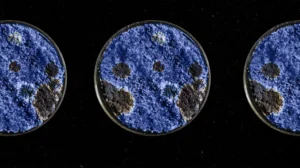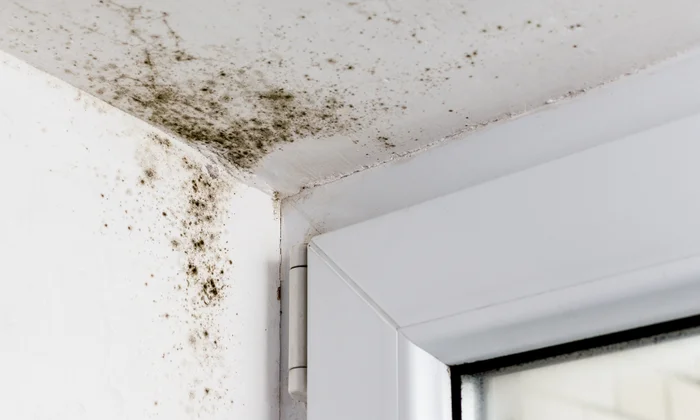Can Mold Cause Cancer:
Molds, on the other hand, present a significant health hazard but does mold cause cancer? Mold does not cause direct cancer but prolonged exposure to certain types of mold leads to serious health conditions; for example, black molds. Mycotoxins are toxic compounds that may also weaken the immune system and develop respiratory infections. Although no direct evidence has been established between mold exposure and cancer, these toxins can contribute to conditions that may lead to increased cancer risk over time.
The most vulnerable are people with weak immunity, allergies, or chronic diseases. Mold prefers to grow in damp and moist places, thus home maintenance should be performed regularly. Leaks should be addressed, ventilation improved, and dehumidifiers used to prevent the growth of mold and lower health risks.
What Is Mold and How Does It Affect Health?
Mold is a fungus that grows in both indoor and outdoor damp, warm areas. It particularly thrives by feeding on organic materials, such as wood, paper, and fabric. The spores that mold produces can easily enter the air and thus become threats to health if inhaled or contacted by the skin.
Mold exposure is known to cause wide-ranging health problems, which are common in patients affected by respiratory diseases, allergies, or immunocompromised states. Common general symptoms associated with exposure include coughing, sneezing, nasal congestion, and irritation of the skin. For prolonged periods, it leads to severe diseases such as asthma attacks, bronchitis, and sinus infections.
Some molds, especially black mold, contain mycotoxins that are harmful to health when inhaled over time. They cause headaches, fatigue, and other respiratory illnesses.

The Science Behind Mold and Cancer
The development of cancer is not known to be directly associated with mold exposure, but various scientific evidence indicates that different types of mold may increase susceptibility to health problems that in time could lead to cancer development. Specifically, mold, especially the black mold, produces mycotoxins, which are dangerous agents damaging to cells. These mycotoxins can debilitate resistance and lead to ongoing aggravation two elements known to add to malignant growth advancement.
The well-being impacts of form openness are for the most part connected with the respiratory framework. Constant openness to mycotoxins has expanded weakness to respiratory contaminations, asthma, and persistent lung infections. All these conditions, if untreated, create an environment in which cellular damage is likely to be promoted, leading eventually to cancer.
Further studies are required to prove the relationship between mold and cancer; however, reducing exposure to mold in residential and occupational settings must be done by removing moisture and ensuring adequate ventilation. Also Read: Fashion Icon Dress
Other Health Risks of Mold Exposure
Beyond the respiratory issue, mold exposure leads to several other health problems. Spores and mycotoxins from molds inhaled or contacted may lead to allergic reactions like sneezing, coughing, and itchy eyes. In people who already have asthma or some kind of respiratory condition, this exposure can worsen the condition by increasing wheezing and shortness of breath.
Notwithstanding respiratory issues, form openness has been related to skin aggravations, like rashes and hives, particularly in individuals with delicate skin. It can likewise cause more difficult circumstances in immunocompromised individuals, remembering diseases for the lungs, skin, or sinuses.
Chronic mold exposure is linked with fatigue, headaches, and memory problems, generally known as “brain fog.” Studies indicate that prolonged mold exposure may lead to chronic inflammatory diseases and neurological complications. Therefore, it becomes very important to deal with the growth of mold sooner, especially in areas with a history of dampness, such as bathrooms and basements, by promoting proper ventilation and moisture levels.
Can Mold Cause Cancer? Expert Opinions
The question of whether mold causes cancer is still an issue that is widely debated among experts, as studies in this area are still on. No direct evidence has ever proven that mold causes cancer, but some specialists still sound a warning about the potential long-term health hazards that come with mold exposure. According to Dr. Richard C. Smith, a toxicologist, “Exposure to mycotoxins produced by mold can compromise the immune system, potentially leading to conditions that may increase the risk of cancer over time.”
Mycotoxins, especially black mold, have been associated with causing respiratory and immune system problems that can lead to chronic inflammation. Chronic inflammation has been associated with some types of cancer.
As an environmental health expert, Dr. Susan Williams adds, “Though mold alone is not directly said to cause cancer, the damage that it does to the body in time cannot be overlooked.”
How to Prevent Mold Growth and Protect Your Health
Preventing mold growth is essential to maintaining a healthy environment and protecting your health. The key to mold prevention is controlling moisture, as mold thrives in damp conditions. Start by fixing any leaks in your plumbing, roof, or windows, as water intrusion is a primary cause of mold growth.
Ensure proper ventilation in areas prone to humidity, such as bathrooms, kitchens, and basements. Use exhaust fans and dehumidifiers to keep indoor air dry. It’s also important to clean and dry any wet areas immediately, as mold can begin to grow within 24 to 48 hours of moisture exposure.
Dr. Susan Jones, an environmental health expert, advises, “Regularly inspecting your home for hidden moisture or water damage can prevent mold from becoming a significant problem.”
What to Do If You Suspect Mold in Your Home
If you suspect mold in your home, it’s crucial to take immediate action to protect your health and prevent further growth. Start by inspecting areas that are prone to dampness, such as bathrooms, basements, and under sinks. Look for visible signs of mold, such as dark spots or a musty smell.
First and foremost, if you discover mold, the initial thing you have to do is take care of the moisture source. Seal leaks in pipes, roofs, or windows that supply water to the mold. As Dr. John Miller, a mold remediation expert, said, “The key to mold removal is controlling the moisture and eliminating the source of water.”
For small mold patches, you can clean the affected area yourself using water, soap, and a mixture of vinegar or hydrogen peroxide. However, for larger infestations, it’s best to call a professional mold remediation service to safely remove the mold and prevent further contamination. Also Read: Land Clearing Business
FAQs:
Could form prompt serious medical issues?
Indeed, over-the-top openness to form can set off respiratory issues, skin disturbance, and in outrageous cases, compound asthma or hypersensitive responses. Persistent well-being problems might be advanced by its presence, especially among immunocompromised people.
How do I know if mold is present in my house?
Visible mold signs include a musty smell, black or green spots, and increased allergy-like symptoms. Check for visible growth in damp areas such as bathrooms and basements.
How can I prevent mold from growing inside my home?
Keep indoor humidity levels below 60%, fix any leaks right away, increase ventilation, and use dehumidifiers in damp areas to prevent mold from growing.
Should I attempt to remove the mold myself?
For minimal mold patches, a DIY remedy with suitable cleaning solutions may be enough. However, a larger infestation requires a professional service to safely remove the mold.
Conclusion:
Though mold does not directly cause cancer, chronic exposure to some types of mold, like black mold, can cause serious health issues. The mycotoxins produced by mold actually weaken the immune system, increase vulnerability to respiratory problems, and therefore require prompt treatment of mold overgrowth.
To protect your health, it’s important to prevent mold by controlling moisture, fixing leaks, and ensuring good ventilation. If mold is suspected, clean small areas yourself or hire professionals for larger infestations. By taking these steps, you can reduce health risks and maintain a safe living environment.

